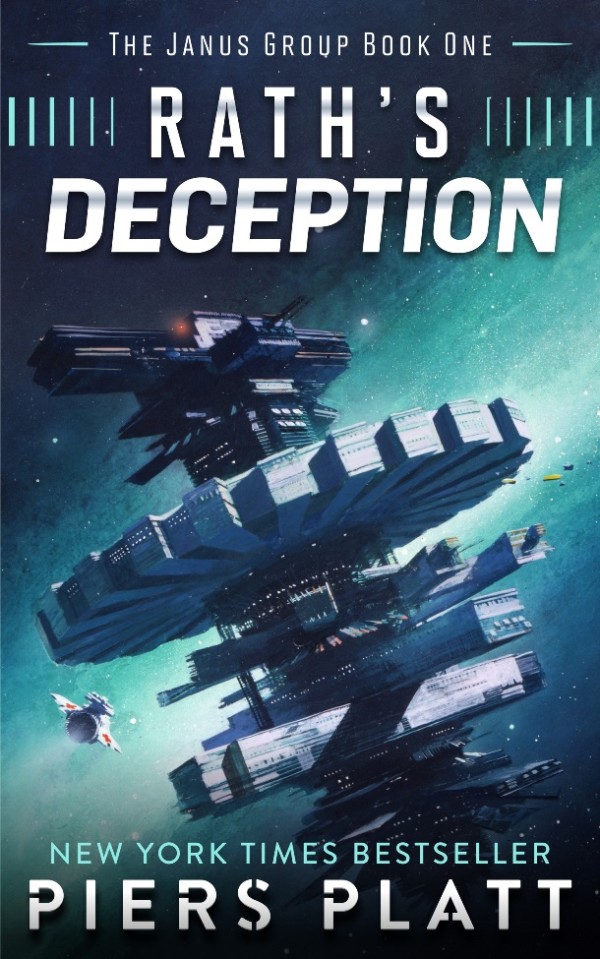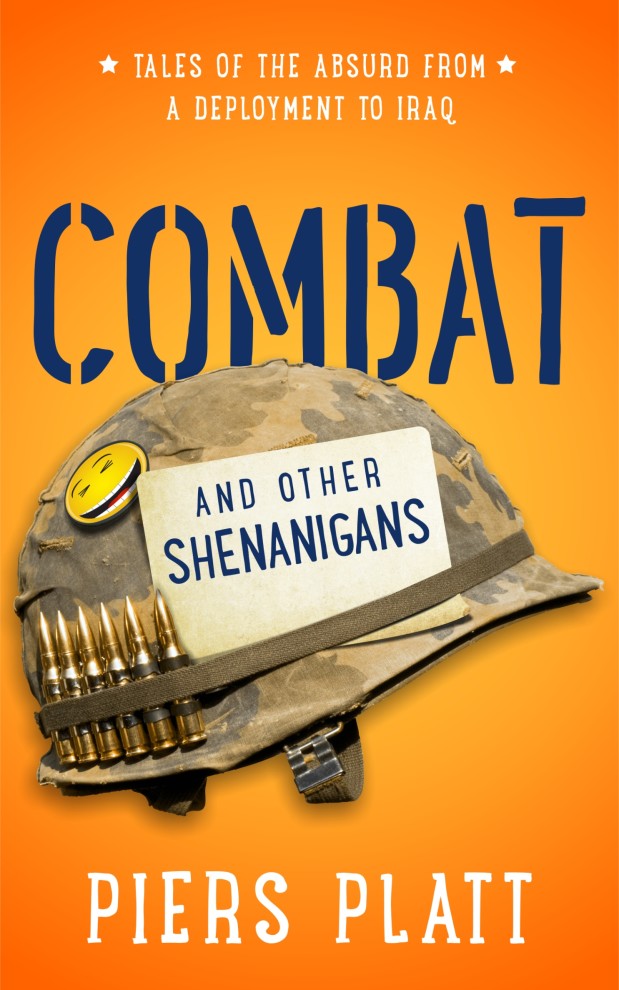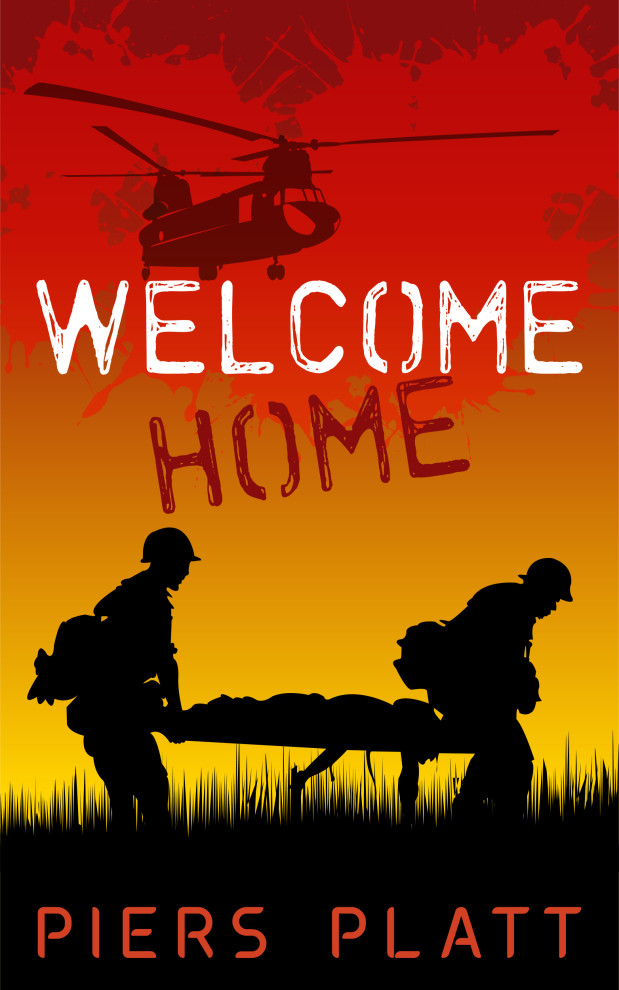SITREP
The Army loves acronyms. If you can figure out how to shorten something complicated to say, you do it – seconds can mean a lot when you’re on the radio during a mission. And if you can make it sound cooler at the same time, well, that’s just icing on the cake 😉
SITREP stands for Situation Report…and after several months of complete radio silence (sorry, been busy!) I figured it was time to give you guys an update. Two pieces of news I wanted to share with you:
First, I finally got around to publishing the first Rath trilogy in a box set. I think many of you have already purchased them, but for those that haven’t, you can now grab Books 1-3 all at once, and save a couple bucks off of the price of buying them individually – here’s the link.
(“But Piers,” you say. “That’s an Amazon link. I want to read the books on some other device!” No sweat, I got you covered. Find out how by clicking here.)
If you’ve already read the Janus Group series, I would HUGELY appreciate your help spreading the word about it. And one of the best ways to do that is to post a quick (and honest) review, telling your fellow readers what you thought of it. Lots of you have already posted your reviews on the individual books (thanks!), but the box set is so new it doesn’t have a single review yet, so it’s looking a bit lonely! If you can spare a minute, please click here and share your thoughts.
Now for the bigger news: I’ve got some NEW books headed your way soon…a brand new sci-fi thriller trilogy, with all new characters and settings. As a little sneak peek, I’m excited to share with you the first chapter of Escape from Oz, the Book 1 in the Falken Chronicles:
In the distant future, Earth’s worst criminals have all disappeared … and no one knows where they’ve been sent.
Sirio Falken has been a fighter his whole life. But when the government bans professional fighting, his life spirals out of control. Convicted of murder, he’s sentenced to life in prison. But all of the felons he’s ever known have disappeared from Earth, never to return. He’s about to find out firsthand what happened to them. He’ll have to stay alive amongst Earth’s most ruthless felons if he wants to survive … and become the first man to escape from Oz.
Chapter 1
No windows on this train, Falken noticed. The sharp edge of the manacles bit into his wrists, chafing him. Either they don’t want anyone to know who’s in the train … or they don’t want us to know where we’re going.
“I’m scared, man.” The prisoner opposite him shifted nervously against the restraint bar across his chest. “You’ve done time before, right?” he asked. “Right, big guy?”
Across the maglev car’s center aisle, Falken sighed. “Yeah. I’ve been in a few times.”
“What for?”
Falken ignored the question. But the man facing him was undeterred.
“A thousand bucks says this here’s the first time you’ve gotten a Class One conviction,” his fellow convict guessed.
Falken eyed the man, but stayed silent.
“You know how I know? This ain’t my first stint, either,” the man said.
Falken could see a bird tattoo on the man’s neck – orange and yellow, it seemed to be bursting out of his collar, wings spreading under his chin. The bird was on fire, Falken realized. What’s that called again? Sphinx? No: phoenix. Reborn from the ashes.
“I done a couple years for B and E,” the man was saying. “But they never pinned a Class One Felony on me before. Not ‘til now.”
The prison transport shook slightly, as the maglev track curved around some unseen obstacle. The two rows of restrained prisoners rocked rhythmically along with the transport, their heads bobbing in sync, as if choreographed in some strange dance. At the front of the car, a pair of guards sat watching the criminals impassively – Falken glanced at them briefly, but neither seemed to care enough to silence the conversation.
“Major crimes are rare,” Falken pointed out. “Because of the government surveillance programs. That’s why you never see violent stuff on the newsnets.”
“No, you never see the violent stuff on the newsnets ‘cause the government don’t want you to see it. But it still happens. Not a lot, but it happens. We here are living proof of that ain’t we?”
True enough, Falken thought. “So what are you trying to say?” he asked.
“Last time you were in, d’you meet any violent offenders?” Phoenix-man replied.
“No,” Falken said. The Class One felon wards were always empty …
“Uh huh. And have you ever, in your whole life, met any Class One felons? In or out of jail?”
Falken considered this for a moment. “No.”
“I knew a guy once that got busted for attempted murder. Long time ago. You know what happened to him after they sent him away?”
“What happened?” Falken asked.
The man shrugged. “Not a clue. Never saw him again, never heard from him again,” he said. “That’s why I’m scared. I’m telling you, violent offenders just disappear.”
Falken frowned. “I heard there’s a special rehab program.”
“Yeah? If they get rehabbed, then why do we never see ‘em again?” The tattooed man shook his head. “More government propaganda. The rehab program’s a fucking pipe dream.”
“Well, they’re not gonna just release us,” Falken pointed out.
“Nope,” the man agreed.
Another convict farther down the line spoke up. “Cheap labor for the newest colonies. Mining and shit.”
Phoenix-man shook his head. “Takes months to train to be an asteroid miner. And years to be a terraformer. You need a degree in … I dunno, science and stuff. You got a degree, pal?”
The other inmate snorted. “Do you?”
“No,” Phoenix-man admitted.
“Why not?” the other inmate asked. “College is free.”
“College is boring,” Phoenix-man corrected him. “And hard. Easier and more fun to be a criminal.”
“How’s that working out for you?” Falken asked him.
“I could ask you the same thing,” Phoenix-man shot back. “What d’you say you were in for?”
“I didn’t,” Falken replied.
“Well, what’s your name, then?” he asked.
“Falken.”
“I’m Orris,” the man said. “Anyway, once they give us our sentences, everyone on Earth would be happy to just forget about us. Petty crimes, minor stuff – they can let that slide. Do a couple years, get out on parole and get your second chance. But this little utopian society of ours don’t have room for hardcore criminals anymore, so they just want us gone. Forever.”
Falken could feel the maglev transport slowing down.
“You know who else had special programs for people they didn’t like?” Orris asked. He leaned forward against his chest restraint, whispering. “The Nazis.”
Falken frowned again, but he felt a shiver of fear run up his spine.
“Ah, you don’t know shit,” the inmate farther down the transport said.
“Maybe. But I know one thing,” Orris observed.
“What’s that?” Falken asked.
“We’re all about to find out.”
* * *
The maglev transport sat motionless, with its interior lights dimmed. Falken guessed that they had docked at the courthouse, though neither of the guards on the transport made any announcement to that effect. They simply unbuckled the first prisoner at the front of the train, checked his handcuffs, and guided him through the access hatch. Nearly twenty minutes later, he reappeared; they sat him down, and then proceeded to unbuckle the next man in line.
Falken had to wait for close to three hours for his turn – his legs were nearly numb when he finally stood up, and he winced as the blood rushed back into them.
“Good luck,” Orris told him, grinning nervously.
Falken shuffled his way through the transport and then out the hatch, led by the two guards, who wore pistols in holsters on their hips. The hatch opened into a narrow corridor, empty save for two doors – one to his right, near the maglev’s hatch, and another door at the end of the corridor. The latter slid open as the guards approached it, and Falken followed them into a small chamber, with worn linoleum floors and harsh white fluorescent bulbs along the ceiling. A battered metal chair and table stood in front of him, arranged in front of a raised wooden bench. Falken sat, and the guards took up stations on either side of the door. A judge in dark robes sat behind the bench: an older man with thinning gray hair, who appeared to be reading from a computer screen. Falken realized he was the same judge that had presided over his trial.
“Place your palm on the scanner, please,” the judge said.
Falken noticed a scanner mounted in the table – he pressed his manacled hand against it, then withdrew it.
“One more time,” the judge said. “It read your prints, but didn’t take the DNA sample.”
“Sorry,” Falken said. He held his hand on the scanner again.
“There it goes.” The judge tapped a stylus against his desk absentmindedly, and then his computer beeped at him.
“Sirio Falken,” the judge announced. “At your trial, a jury of your peers found you guilty of murder. This will serve as your sentencing.”
“Is my lawyer coming?” Falken asked. “He was at my last sentencing.”
“No,” the judge replied. “He submitted his sentencing recommendation to me electronically, as did the prosecutor.”
“That doesn’t seem fair,” Falken said.
“I’m not particularly concerned with your opinion at this stage, Mr. Falken,” the judge observed. “If the judicial process seems unusual in this case, let me remind you that your crime was highly unusual. Mankind has evolved, Mr. Falken. We no longer seek revenge for personal insults by killing one another, no matter how wronged we might feel.”
Falken stayed silent.
“Now,” the judge continued, “your lawyer has suggested the minimum sentence, which in this case would be thirty years, eligible for parole in twenty. He points out that prior to the murder, you had been working with your court-appointed counselor on managing your anger more productively. And he argues that in this case, the victim’s actions may have provoked you into a state of temporary insanity.”
The judge looked up from his computer, meeting Falken’s eyes. “Are you sorry for what you did, Mr. Falken?”
“Yes,” Falken said. “I never meant to kill him. I wish I hadn’t.”
The judge studied him in silence. “I believe that might be true. But is that remorse a product of having been caught, or because you realize that what you did was wrong?”
Falken cleared his throat. “I know it was wrong to kill him.”
“Mm. And how would you handle the situation differently, given a second chance?”
Falken searched for an answer. “I wouldn’t go to his apartment at all.”
“Indeed. And what would you do instead?”
“… I don’t know.”
The judge narrowed his eyes. “That concerns me, Mr. Falken. It concerns me that a man of your physical strength and professional training has trouble thinking of a course of action that doesn’t involve confrontation and violence. Such a man is a danger to society. You’ve proven it, three times now. Your first two victims are still alive, and presumably healthy now, despite the beating you gave each of them. But your last victim is not. And I have a responsibility to ensure that he is your last victim, Mr. Falken … and not your latest victim.”
“I’m not going to kill anyone again,” Falken assured the judge.
“Words are cheap, Mr. Falken. But I wonder how you will react when someone angers you again. Well, we’ll see,” the judge mused. “Stand.”
Falken stood up.
“Mr. Falken, given your criminal record and the violent nature of your crime, you are hereby sentenced to life in prison. Parole eligibility in fifty years.”
Falken took a step back, shuddering. He tried to swallow, but his throat was too dry. “Can … can my lawyer appeal?”
“Appeal what? Your guilty conviction, or the sentence?”
“Both, I guess.”
The judge nodded. “You’ll have a chance to contact your lawyer again once you reach your destination.”
“Where am I going?”
“Some place where you can no longer be a danger to your fellow citizens, Mr. Falken. A place where you will have ample opportunity to reflect on your crimes. When you get there, I want you to think about how you can control that anger of yours. Try using your mind to solve your problems for once,” the judge said. He held up his fists. “Not these.”
“Yeah, but where’s the prison?” Falken asked.
“You’ll find out soon enough,” the judge said. “Now, you’re permitted a final vidcall, before transport and in-processing. Would you like to use it?”
“Yes,” Falken said.
The guards stepped forward, and took Falken back down the entry corridor. He felt hollow and detached somehow, as if he was watching himself from the outside. The judge’s words echoed in his ears.
Life in prison. Parole in fifty years.
The guards stopped before they reached the hatch leading back into the maglev transport, and opened a door to a small booth with a seat and a video terminal.
“Ten minutes,” one of the guards said, as Falken sat down. “There’ll be a timer on the screen.” He activated the terminal and then stepped back, shutting the glass door to the booth.
Falken shook his head, forcing himself to push away thoughts of his sentence, and dialed the number from memory. Mallerie picked up on the third ring. She frowned at the screen, and then recognition dawned, and she gasped. She hung up hurriedly before Falken could say a word.
He dialed her number again. It rang ten times, and then an automated voice suggested that he leave her a message. Falken stabbed the Disconnect key, and then redialed. Ten rings, no answer. Falken swore, and felt his hands bunch into fists. He punched the console in frustration, then dialed again. And again.
“I don’t want to talk to you,” Mallerie said, her sudden appearance on the monitor startling Falken.
“Just wait, don’t hang up,” Falken pleaded.
“I don’t want to talk to you,” she repeated.
“Why not?”
She sniffed. Falken could see that her cheeks were wet, her eyes puffy from crying. “There’s nothing left to say, Sirio.”
“I’m sorry, Mal,” he tried. “I fucked up real bad.”
“How many times have I heard you say that?” she asked.
Falken bit his lip. “I just … I lost control. I got so angry knowing … what he’d done. What you’d done.”
“If you’re looking for an apology from me …” she started.
“No,” he said. “Just trying to explain. I wasn’t thinking straight.”
“He didn’t deserve to die,” Mallerie said.
“No,” Falken agreed. “The jury said I was guilty,” he said, changing the subject.
“Well, you are guilty.”
“They’re giving me life,” he told her. “Parole in fifty years.”
He saw her take a deep, shuddering breath.
“I don’t know where they’re sending me, but will you try to visit me?” he asked.
She shook her head silently. Falken glanced at the timer onscreen, which showed just over a minute remaining.
“They’re gonna cut me off in a few seconds,” he warned. “So I just wanted to say … I love you.”
Mallerie wiped a tear from one eye. She took another deep breath, and then faced him. “Goodbye, Sirio.” The screen went black, and he realized she had hung up again. The timer clicked down to zero, and then the glass door slid open.
“Let’s go, big fella,” the guard said.
Falken stood. “Where?” he asked.
“Back to your seat,” the guard replied, guiding him back onto the maglev transport. At his seat, the guard turned him by the elbow and encouraged him to sit with a firm grip on Falken’s shoulder.
“Where am I going?” Falken repeated.
The guard ignored him, and merely buckled his restraint, locking it back into place.
…that’s it for now! I’ll be sharing more details of the Falken Chronicles as it gets closer to coming out. In the meantime, remember that the Janus Group Books 1-3 bundle is now out. Please consider:
Buying your copy here if you haven’t read them yet…
…or posting your review here if you have!












